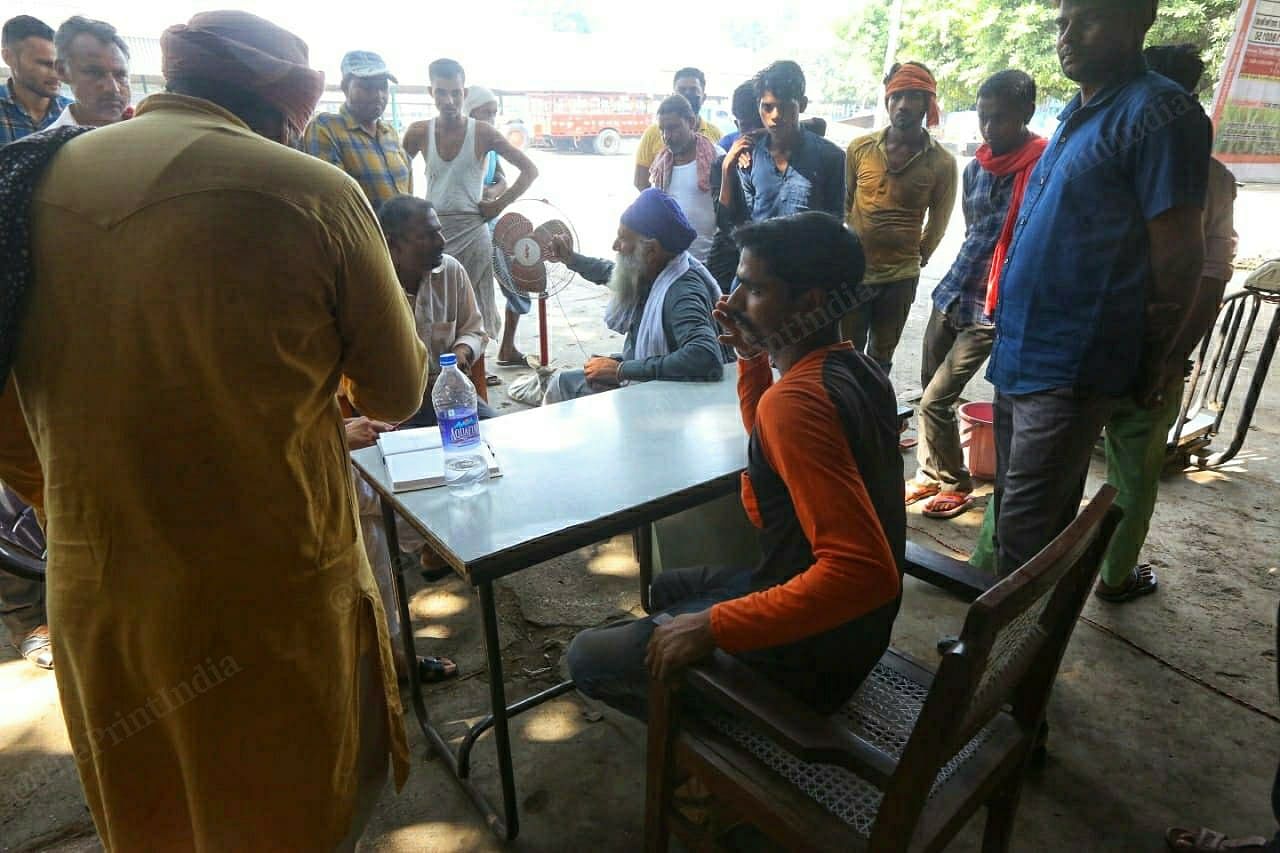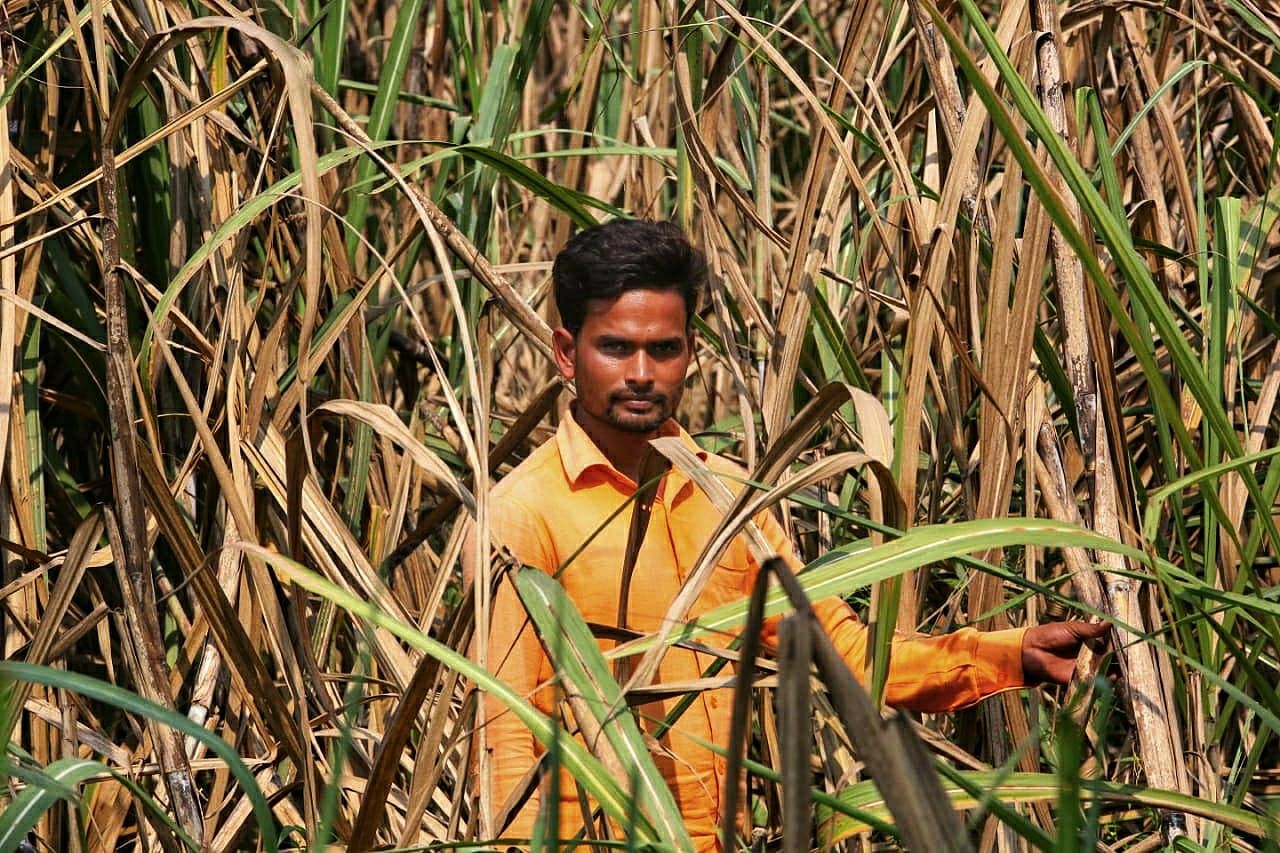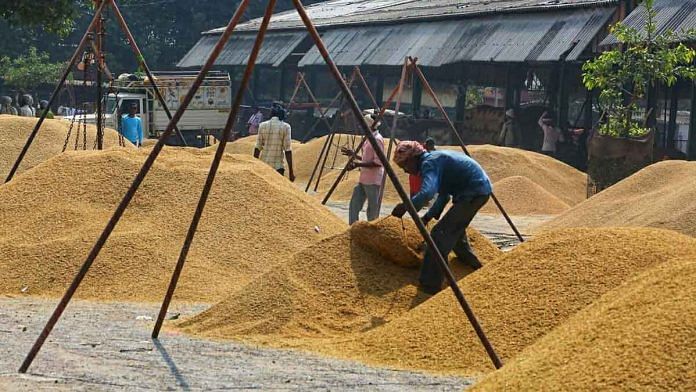Lakhimpur Kheri: Paddy-laden trucks lined the Lakhpedaganj Centre FSS, the mandi in the Lakhimpur Kheri district Thursday morning. Farmers from across the district were busy trying to drown each other’s voices while negotiating prices with commission agents and traders.
Meanwhile, government functionaries on the other end were conspicuously silent, exchanging only looks to communicate.
In Uttar Pradesh, paddy is procured at the Minimum Support Price (MSP) of Rs 1,975 per quintal by the government, but commission agents do not give anything more than Rs 1,100-1,200 per quintal for it.
However, it is not always easy to sell produce to the government.
Inderrjeet Singh, a 62-year-old farmer from Sikandrabad, decided to try his luck at selling his paddy to the government functionaries nonetheless.
The coordinator of the centre Rohit Kumar first told Singh that they would not be able to buy the produce if the moisture level was more than 17 per cent. By this time, a number of farmers had also moved to the table next to the government coordinator, awaiting his next move.
“It is 16.6 per cent,” said Singh, hoping that this time he would be able to get a fair price for his produce. Another government worker then quickly interjected and said the percentage should be around 14 per cent.
When ThePrint told him that according to government rules, it should indeed be under 17 per cent, the worker asked Singh to complete the paperwork online.
“But there is no net connectivity. How can I do the paperwork online,” asked Singh.
This exchange is just one example of the many issues that wheat and rice producers of Lakhimpur Kheri face while trying to get a fair price for their produce even though the government claims it buys directly from farmers.
At the Lakhpedaganj Centre, the farmers alleged that they are given a number of excuses to dissuade them from selling their produce to the government centre.
“Sometimes they say the net is not working, then they say the paddy has moisture, then they claim it is not clean. But if you agree to give them a cut, all these excuses vanish,” said Gurmail Singh, a resident of Sikandrabad.
Lakhimpur Kheri was in news recently after a convoy of three SUVs, including one allegedly owned by Union Minister Ajay Mishra’s son Ashish Mishra, mowed down protesting farmers, killing four. The violent clashes that followed led to the deaths of four others. Ashish Mishra was arrested by the Uttar Pradesh Police Saturday.

Also read: How an agritech firm is helping Haryana, Punjab farmers use bio-decomposer to curb stubble burning
Paddy farmers in Lakhimpur Kheri
Dubbed as the ‘sugar bowl of India’, Lakhimpur Kheri, located about 130 km from Uttar Pradesh’s capital Lucknow, is known for its high cultivation of sugarcane. But farmers in the area also produce wheat and paddy.
When asked about the amount of paddy procured from farmers, Kumar told ThePrint that the government had not acquired anything so far.
“The season has just started from October, it’s been seven days only. We will procure it for sure,” he said, adding that every day they procure around 350 quintals of paddy when the process starts.
The centre’s incharge Gyansingh Yadav, also noted that they had procured 26,000 quintals in the last season.
“We can’t accept anything that’s less than 17 per cent but we do have facilities of a dryer and for threshing too. At times the paddy is not clean and we get that (clean the produce) done too,” he said.
When informed about the events at the Lakhpedaganj Centre, Kumar said internet connectivity will also be restored soon and as the festive season has just begun, most farmers have not started selling their produce.
“There are 15 such centres where farmers can sell their produce directly to the government. We have all the facilities at the centre,” he said.

Farmers in the district, meanwhile, are against the three contentious farm laws and noted that MSP should be made a legal right to ensure they can sell their produce for the right price even in the open market.
“They are trying to make it a Hindu and Sikh farmers issue, trying to pit one against the other. We are all farmers. Our concerns are the same and we want the government to make MSP a legal right. Make those changes in the farm laws and no one will have any problem,” said Bodh Narayan, another farmer who had come to sell at the centre.
“I have to spend on fertilisers, labour and then I am not even able to save anything. My paddy has a bit of moisture and as the government won’t even dry it and buy it, I have to sell it through the commission agent. I am helpless, I can’t starve my family,” said Santosh Kumar from the Maksoha village in Lakhimpur.
While drying facilities are available at the government centres, ThePrint found them locked and not in use.
According to the Yogi Adityanath government, meanwhile, the procurement process has become much better since the middlemen were done away with.
“As far as the issue of paddy procurement is concerned, the season has just started and the government procures from the farmers. Network connectivity issue is something that Lakhimpur faces due to the proximity to Nepal. This is something we are addressing alongwith the central government,” said Sidharth Nath Singh, UP Cabinet minister.
“Procurement is much better now as we have done away with the middlemen (arthiyas). So people get a better price. Each agricultural product be it paddy, grain and sugarcane Yogi government has procured more than combined purchases of BSP (Bahujan Samaj Party) and SP (Samajwadi Party) governments in the last 10 years,” Singh told ThePrint.
Also read: Farmers don’t kill, my son should be ‘martyr’ — father of BJP worker killed in Lakhimpur Kheri
Sugarcane woes
It is not just producers of paddy that have been facing issues while trying to sell their produce. With delayed payments from mills and the low minimum price of sugarcane, sugarcane farmers in the district have also been feeling the pinch.
Sugar mills issue tokens (parchi) to the farmers for procurement of their crops according to their land size. There are 120 such sugar mills in Uttar Pradesh.
“Bade kisan ki parchibanti hai asani se (Big farmers get tokens easily). We are forced to sell to private players or are given very few parchis. If we manage to get a parchi we are assured a sum of Rs 325 from the mills but we often have a lot of stock so we have no option but to sell it to the private players in the open market at Rs 200,” said Javed Khan, a farmer from Gyanpur village in Lakhimpur Kheri.
“I have 12-3 bigha so I usually get 4 parchis. Technically 40-50 quintals come on one parchi. But we produce much more so that has to be sold in the open market. I have not been paid for the last season and had to take a loan but the interest is quite high,” he added.
Deshraj Verma, another farmer from Gyanpur, said the delays in getting the tokens often leads to the crops drying up.
“This time has been worse as the crop dried up and it led to a loss of Rs 55,000. I was issued nine parchis last time but got payment for only two, so far. It is difficult to be a farmer and survive,” he added.

This distress was echoed by farmers from other villages in the district as well.
Mohammed Sohail from the Jhau Purwa village, said that delay in payments makes it extremely difficult for farmers like him.
“Crops have to be protected. We spend so much on pesticides and fertilisers and finally when we manage to sell it, the delayed payment becomes a major problem,” he said.
Chhabeg Singh, a resident of Sikanderpur village, also said unless the payment from sugar mills is put on track, farmers will continue to suffer.
“(Generally) mills started on 7 November last year and continued till April 5-6, 2021. (But) We have not got any payment after December 15. How can we function like this? We have to pay for transport, labour for peeling the canes, pesticides, fertiliser. At times, we have to take land on contract so we are running into losses,” he said.
According to BJP’s Singh, however, most mills have cleared their dues.
“Apart from Bajaj Sugar Mills, all other mills have cleared their payment. They have made payments up to 92 to 100 per cent. The issue of Bajaj mills is being taken up seriously and we have booked their director and we have registered an FIR against the owners,” he said.
“87% sugarcane payment has been done. Out of Rs 33,000 crore only Rs 4000 crore is left. We are expected to get Rs 600 crore from the central government too. All payments are on track,” said Sanjay Bhoosreddy, additional chief secretary, sugarcane and excise, Uttar Pradesh government.
Sugarcane farmers in the district are also not happy with farm laws because they claim it will encourage contract farming.
“Under contract farming, the company has an agreement with the farmer to grow the crops they want, not what the farmer wants. So the company becomes the main buyer of the product and they can exploit this situation by setting the price they want. These firms prefer to work with big farmers so people like us will suffer all the more,” said farmer Mandeep Singh.
Farmers also want the minimum price to be increased to Rs 450 to 500 per quintal. The UP government increased the price from Rs 325 to Rs 350 last year but the farmers claim that they are yet to receive the hiked price for their produce.
“We are not fighting for ourselves but for the entire farming community. Many in the media claim only ‘sardar farmers’ are upset but let me tell you all farmers are angry. This will reflect in the elections,” said Amardeep Singh, a sugarcane farmer in the district.
Also read: India’s small & marginal farmers have essentially become wage labourers, data shows



